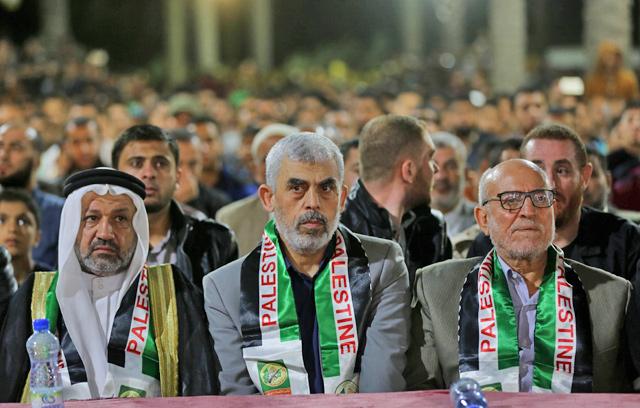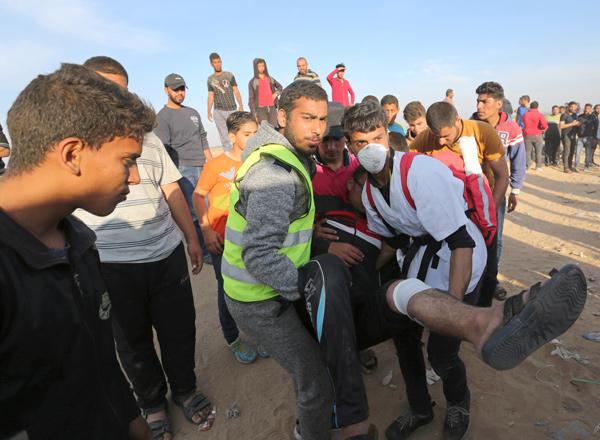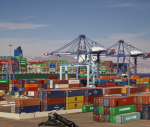You are here
Backed into a corner, Hamas adopts peaceful strategy
By AFP - May 12,2018 - Last updated at May 12,2018

Leader of Hamas in the Gaza Strip, Yahya Sinwar (centre) attends the commemorative ceremony for Izz ad-Din Al Qassam Brigades’ six members who lost their lives in a blast in the central Gaza Strip in Deir Al Balah, Gaza, on May 08 (Anadolu Agency)
GAZA CITY, Palestinian Territories (AFP) — Renowned for taking on Israeli occupation forces, Hamas is keeping its guns silent for a change as it backs border protests, a move analysts say is more opportunistic than a switch to peaceful ideology.
The Palestinian Islamist movement’s normally secretive Gaza head Yahya Sinwar gave a first ever briefing to international journalists this week, ahead of a major protest along the Israel-Gaza border to coincide with the United States moving its embassy to occupied Jerusalem from Tel Aviv on May 14.
Sinwar stressed the movement would not give up its weapons but committed its full backing to weeks of border protests against Israel.
Since March 30 thousands of Palestinians have gathered weekly along the border to demand a right to return to their historic homelands now inside Israel.
While some have thrown rocks and rolled burning tyres at Israeli occupation snipers along the border, there has been almost no gunfire — despite the presence of members of Hamas’s vast armed wing.
Fifty-three Palestinians have been killed by Israeli occupation forces’ fire, however, while no Israelis have been hurt.
“If we have a way to potentially resolve the conflict without death, we’re ok with that,” Sinwar said on Thursday, calling the protests purely peaceful.
Israel claims it is “protecting its borders” and only fires when all other means of deterrence have failed.
Jamal Al Fadi, a professor of political science in Gaza, said Hamas was searching for a way to refocus pressure on the decade-long Israeli blockade of the enclave and its humanitarian implications without risking another devastating war.
Three confrontations since 2008 have battered Gaza while causing comparatively little damage to Israel, and Israeli officials have threatened further destruction in the event of a fourth round.
Lack of options
“Hamas has resorted to peaceful protests because other options are expensive for it,” Fadi said.
“If the people hold peaceful protests it rallies international opinion to the Palestinian cause.”
The protests are officially organised by civil society organisations but they have Hamas’s explicit support and a number of the dead have been members of Hamas.
Sinwar pointed out they had not been carrying weapons when killed.
Seven weeks of marches are due to culminate on May 14 and 15, with thousands of protesters expected to gather.
Israel enforces a crippling blockade of Gaza it says is necessary to isolate Hamas, but critics say it amounts to collective punishment for the strip’s 2 million residents.
Hamas maintains a large armed wing and military arsenal, but in recent years the Iranian-backed movement has found itself increasingly isolated.
Gulf Arab countries such as Saudi Arabia have appeared to privately soften their position regarding Israel in the face of the perceived joint threat of Iranian aggression, while Qatar, another longtime supporter of Hamas, has been blockaded by its neighbours.
Wars in Syria, Yemen and elsewhere have dragged global attention away from the Palestinians, while the election of Donald Trump in the United States brought to power a government he vowed would be the most pro-Israeli in US history.
Hamas is considered a terrorist movement by Israel, the United States and the European Union.
Armed resistance ‘useless’
Sinwar, who came to power in February 2017, has been seeking largely unsuccessfully to improve Hamas’s strategic position.
The party adjusted its founding charter to tone down some of its rhetoric, though without retracting its call for Israel’s destruction.
Sinwar also pushed for an ultimately unsuccessful reconciliation deal with the West Bank-based Palestinian government.
Mukhaimer Abu Saada, professor of political science at Gaza’s Al Azhar University, said Hamas has realised armed resistance is “useless” currently as a new war with Israel would result in “unprecedented destruction” in Gaza.
Sinwar himself came from the movement’s armed wing and was serving multiple life sentences in Israel for murder before being released in a controversial 2011 prisoner exchange.
What happens after the protests are officially due to end on Tuesday remains unclear.
Hugh Lovatt, Israel-Palestine fellow with the European Council for Foreign Relations, said so far mass protests in Gaza had not been met with similar confrontations in areas outside Hamas control.
“The big question [over a wider escalation] is whether large-scale protests erupt next week in the West Bank.”
Sinwar vowed action would continue.
“This is an Intifada for the right of return. It can continue until we achieve our rights.”
Related Articles
GAZA CITY — Hamas elected in secret a hardline member of the Palestinian Islamist movement's armed wing as its new Gaza leader on Monday, in
Gaza City, Palestinian Territories — A senior member of Gaza’s Hamas rulers said Wednesday that all but a dozen of the 62 Palestinians kille
GAZA — A series of meetings between Hamas and senior officials in Cairo in recent weeks points to improving ties between Egypt and the Islam


















